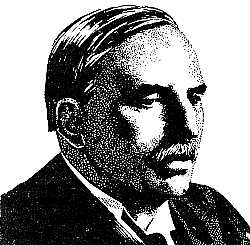 Sir Ernest Rutherford In 1911 Sir Ernest Rutherford of the University of Manchester in England formulated a model of the atom which was a forerunner of our present conception. He described the atom as being made up of a very small but very heavy nucleus carrying positive electrical charges and around this nucleus the negative electrons are spaced in various configurations. In 1913 Niels Bohr, the Danish physicist extended Rutherford's theory and advanced the idea that the electrons revolve about the nucleus of the atom, similar to the planets revolving around the sun. Rutherford also suggested that if the nucleus of an atom could be hit hard enough to fracture it different kinds of atoms would be produced. In 1919 he accomplished the first artificial transmutation. After this experiment his only regret was that he did not have a more powerful hammer or projectile with which to strike the atom. This was provided in 1931 when Dr. E. O. Lawrence of the University of California invented the cyclotron which can accelerate positively charged particles to speeds as high as 10,000 miles per second. In 1932 while the Frenchman, Joliot and his wife, Irene Curie, were bombarding atoms of Beryllium with particles from radioactive Polonium, they observed a strange effect. |








